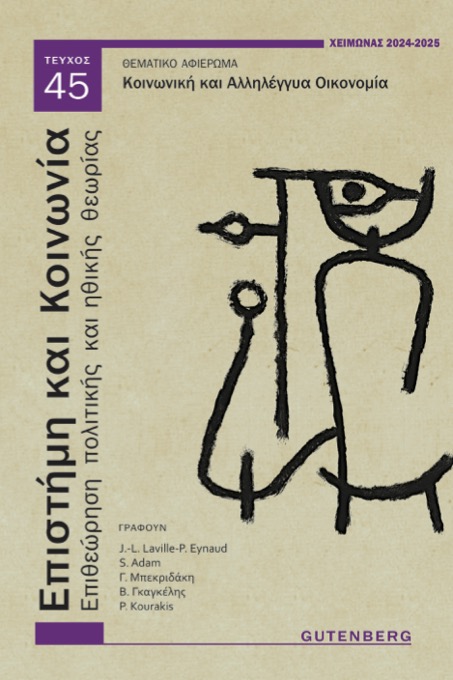Η ανατίμηση του κοινωνικού παράγοντα στην Κοινωνική Αλληλέγγυα Οικονομία
Abstract
This article attempts to reorganize the main characteristics and strategies that have been documented in the literature on the Social Solidarity Economy (hereafter S.S.E.) with the aim of outlining two main approaches: the alleviative and the transformative. The focus on the content, attributed to the social factor in each of the approaches served as a criterion for the above categorization, as the main goal of the article is to explore the potential of S.S.E. to bring about social changes in the realm of socio-economic relations, institutions, and systems. For this purpose we utilize three features of the theory of structuration, as that theoretical attempt to link human action with institutions and the social system: a) signification, b) domination, and c) legitimation. The idea is to attempt a first coupling of these characteristics with key features attributed to the actions of S.S.E. with the aim of opening new research paths in the direction of studying the relation between S.S.E. and broader social transformations. More specifically, we highlight that consistency in redefining the economy, the strength of democratic solidarity as a bond, and the legitimation of a type of questioning of existing rules are pivotal issues in the transformative potential of the initiatives.
Article Details
- How to Cite
-
ΜΠΕΚΡΙΔΑΚΗ Γ. (2025). Η ανατίμηση του κοινωνικού παράγοντα στην Κοινωνική Αλληλέγγυα Οικονομία . Science and Society: Journal of Political and Moral Theory, (45), 77–105. Retrieved from https://ejournals.epublishing.ekt.gr/index.php/sas/article/view/38271
- Section
- Articles

This work is licensed under a Creative Commons Attribution-NonCommercial-ShareAlike 4.0 International License.
Authors who publish with this journal agree to the following terms:- Authors retain copyright and grant the journal right of first publication with the work simultaneously licensed under a Creative Commons Attribution-NonCommercial-ShareAlike License that allows others to share the work, not for commercial purposes, with an acknowledgement of the work's authorship and initial publication in this journal. If you remix, transform, or build upon the material, you must distribute your contributions under the same license as the original.
- Authors are able to enter into separate, additional contractual arrangements for the non-exclusive distribution of the journal's published version of the work (e.g., post it to an institutional repository or publish it in a book), with an acknowledgement of its initial publication in this journal.
- Authors are permitted and encouraged to post their work online (e.g., in institutional repositories or on their website) prior to and during the submission process, as it can lead to productive exchanges, as well as earlier and greater citation of published work (See The Effect of Open Access).



